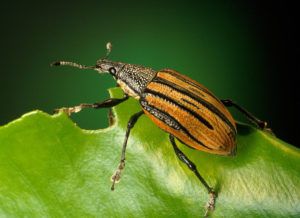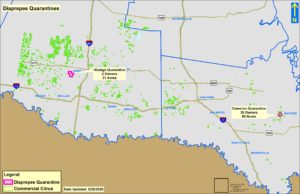The Diaprepes root weevil (Diaprepes abbreviatus) is a root weevil native to the Caribbean where at least 16 additional species within the genus are known. Diaprepes abbreviatus has a wide host range, attacking about 270 different plants including citrus, sugarcane, vegetables, potatoes, woody field-grown ornamentals, sweet potatoes, papaya, guava, mahogany, containerized ornamentals, and non-cultivated wild plants.
Notching along the margins of young leaves is a telltale symptom of the presence of D. abbreviatus adults, or other related root weevils. The larvae of D. abbreviatus are found in the soil where they feed on the roots of the host. They will often girdle the taproot, impeding the ability of the plant to take up water and nutrients resulting in plant mortality. In addition, this type of injury provides an avenue for root rot infections by Phytophtora. A single larva can kill young hosts while several larvae can cause serious decline of older, established hosts. Because larvae are below ground, it is difficult to detect them before decline of above ground potions of the host is observed.
Here is a link to a map showing the new quarantined area in Cameron county: https://arcg.is/XOCr
For more information please visit the TDA Diaprepes webpage HERE.
CLICK HERE to view an interactive map of quarantined areas in Cameron County.
Hidalgo County:
CLICK HERE to view an interactive map of quarantined areas in Hidalgo County.
Harris County:
CLICK HERE to view an interactive map of quarantined areas in Harris County.




 Report Sick Citrus
Report Sick Citrus
